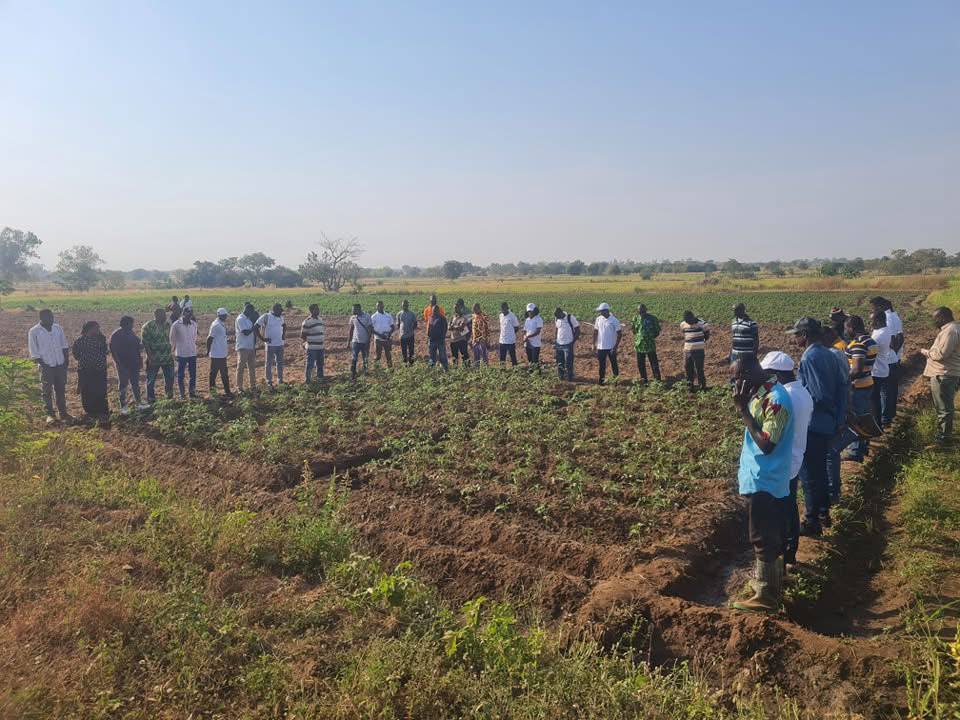FSRP SCHEME TO ARREST SEASONAL TOMATO SHORTAGES, ADVANCES INTO SECOND PHASE
The FSRP-Norwegian Tomato scheme targeted at producing 10,000 metric tons of tomatoes by February next year, has rolled into its second phase in the Upper East Region. This forms part of interventions by the West Africa Food System Resilience Programme (FSRP) - under the Ministry of Food & Agriculture, to tackle the yearly incidence of tomato shortages and fluctuating prices around the country. The scheme is being carried out through Norwegian support and World Bank coordination, to revamp the Ghanaian tomato industry for year-round availability of the produce by way of dry season production.
In line with this, FSRP has deployed a combination of demonstrative on-field ‘Training-of-Trainers’ exercises for Agric Extension Agents, among other agric practitioners within selected tomato producing sites in Ghana. At the Tono Irrigation Scheme near Bolgatanga, the exercises delved into best practices and climate-resilient know-how in field management, cultural practices; soil, water, and nutrient management; pest and diseases control; and post-harvest strategies. The practitioners would in-turn pass on the skills and knowledge acquired to farmer groups under their supervision, with a view to arresting the shortage phenomenon over a calculated period.
TARGET
In all, 1500 tomato farmers are being and supported through the FSRP-Norwegian Tomato scheme, with inputs and new skills to produce 10,000 metric tons of tomatoes by February next year. It is being implemented under the supervision of the Ministry of Food & Agriculture and coordinated by The World Bank.
CONTRIBUTING EXPERTS
Technical experts from relevant agencies are playing various roles towards revamping the Ghanaian tomato industry through dry season production:
-The Crop Research Institute of the Council for Scientific & Industrial Research (CRI-CSIR) and the West Africa Centre for Crop Improvement (WACCI) are introducing trainers to researched-based climate-smart varieties.
-The Soil Research Institute (CSIR-SRI) is giving critical must-do soil science know-hows.
-The Directorate of Crop Services (DCS-MOFA), the Directorate of Agric Extension Services (DAES-MOFA), the Plant Protection & Regulatory Services Directorate (PPRSD-MOFA) and the World Vegetable Centre (WorldVeg) are training farmer-based organisations on agronomy and best practices.
-The Food Research Institute of CSIR (FRI-CSIR) and Women in Agric Development (WIAD) are sharing best processing and storage practices; and
-Market Queens are engaging participants with insights into sales and distribution.
PHASE ONE
The first phase of the exercise was held in October this year. It took the practitioners through best practices in germination tests, carbonated rice husk preparation for biochar, soil media sterilization, seed tray and seed box nursery establishment, ground nursery establishment, insect-proof net construction and soil solarization. This was followed by input supplies and field monitoring visits to ascertain adherence to the principles and practices shared.
OVERVIEW
Tomatoes are an essential part of the Ghanaian diet, accounting for 40 percent of vegetable expenditures. However, only 34 percent of the 1.4 million tons of tomatoes consumed annually in Ghana are produced locally. This results in substantial imports (especially between Dec and May). Challenges that confront the local tomato industry include: the use of poor-quality seed; the absence of seeds well adapted to local seasons and climate variabilities; pests & diseases control lapses; poor agronomic/farm practices; post-harvest losses (ranging from 20% to 60%); and the absence of innovative storage methods. All these result in low average yields of 8.3 metric tons per hector (instead of potential yields of 20 metric tons per hector); leading to sharp fluctuations between glut/low prices (during peak season harvests) and shortages/dramatically high prices (during off-seasons).
[Bolga; December 2024]


Comments (0)
No comments yet. Be the first to comment!